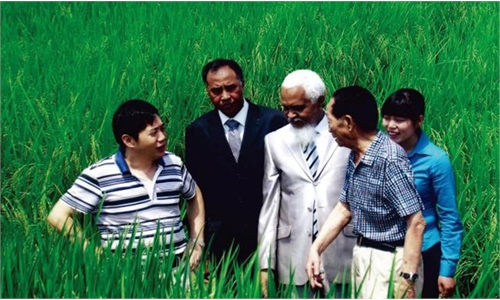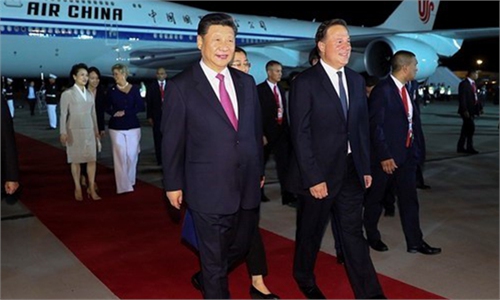The Green Wormwood Makes a Powerful Eastern Medicine — A Gift from Traditional Chinese Medicine to the World
On October 4, 1971, in a lab of the Institute of Chinese Materia Medica, China Academy of Chinese Medical Sciences, researchers held their breaths as they waited for the final results of an experiment on the antimalarial properties of a sample of ether-based neutral extract of artemisinin. Finally, the results came out: The sample inhibited plasmodium parasites at a rate of 100 percent! The lab erupted with excitement and the head of the research team, Tu Youyou, broke into a gratified smile.
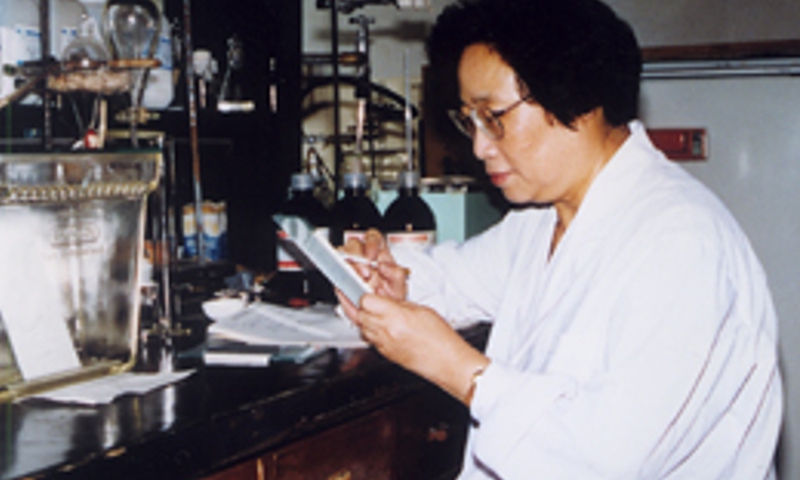
In The Book of Songs, a collection of ancient Chinese poetry, the words "youyou" and "wormwood" are found together in a line depicting an idyllic scene of grazing deers. In this sense, the bond between Tu Youyou and artemisinin, the wormwood extract, seems somewhat predestined. Wormwood, a humble member of the daisy family, looks common but has power great enough to save lives. Much like it, Tu Youyou remained in obscurity for decades as she studied artemisinin and its derivatives, yet she and her team made a discovery that cured more than 200 million malaria sufferers across the world.
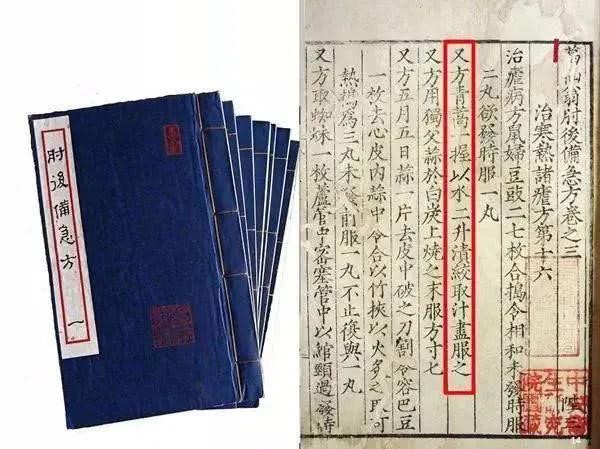
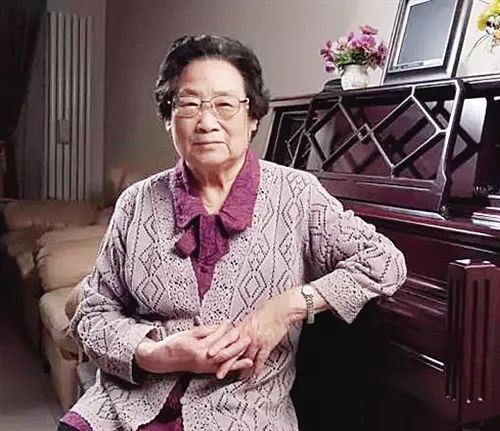
On December 10, 2015, at the Stockholm Concert Hall in the capital of Sweden, Tu Youyou received the diploma, medal and cash award of the Nobel Prize in Physiology or Medicine from Swedish King Carl XVI Gustaf. The concert hall reverberated with the sound of a warm standing ovation. By then, it had been 44 years since the experiment on the antimalarial properties of an artemisinin sample achieved success. The malaria expert who had worked on the front line of research for decades finally won China's first Nobel Prize in science for domestically-conducted scientific research with her outstanding contribution to malaria treatment. Thanks to her, TCM is shining brightly on the world stage.
Honors flooded in: the 2016 State Preeminent Science and Technology Award, Forbes China Top 50 Women in Tech, Time's 100 Women of the Year, candidate of the BBC's Icons: the Greatest Person of the 20th Century ... Many eyes were on this female scientist who has made outstanding contributions to medical research worldwide, but she continued her life as usual. In 2016, she donated one million yuan ($155,040) out of her Nobel Prize award to the Peking University Health Science Center to set up a Tu Youyou Talent Award Foundation, and another one million yuan to the China Academy of Chinese Medical Sciences to set up an innovation fund to encourage young people to engage in TCM research.
On September 29, 2019, the Presentation Ceremony of National Medals and National Honorary Titles of the People's Republic of China was held at the Golden Hall of the Great Hall of the People in Beijing. Xi Jinping, General Secretary of the Central Committee of the Communist Party of China, President of China and Chairman of the Central Military Commission, awarded the Medal of the Republic to Tu Youyou. On the same day, the Party group of the National Administration of Traditional Chinese Medicine issued the Decision on Learning from Recipient of the Medal of the Republic Comrade Tu Youyou, calling on all those in China's TCM sector to follow the example of Tu Youyou. The Decision pointed out that like Tu youyou, one must step up to responsibilities with the motherland in mind, devote oneself to serving the country through science, put the interests of the nation and the people first, and make it one's lifelong pursuit to take the needs of the country as one's own. One must uphold the spirit of dedication and sacrifice, remain true to one's original aspiration and mission, fully leverage the unique strengths of TCM, and contribute to building a healthy China and achieving the two centenary goals.
Today, Tu Youyou is nearly 90 years old but has yet to count herself as a retiree. Cultivating more professionals for the cause of TCM has become her new goal as she begins the ninth decade of her life.
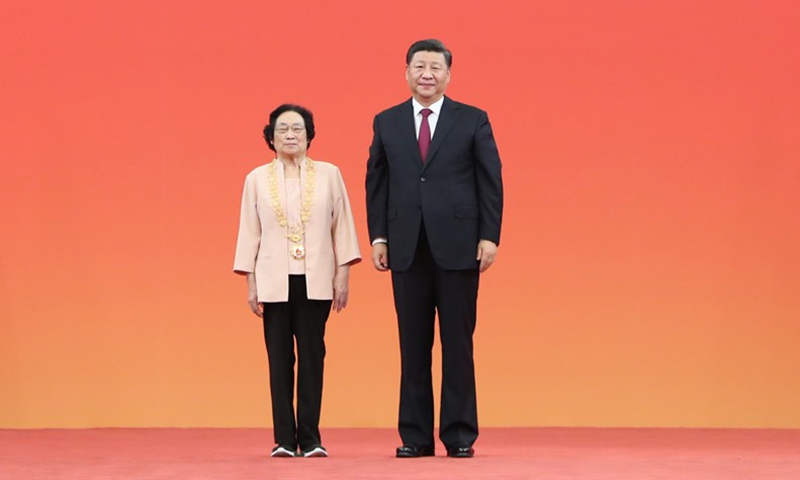

Tu Youyou
In The Book of Songs, a collection of ancient Chinese poetry, the words "youyou" and "wormwood" are found together in a line depicting an idyllic scene of grazing deers. In this sense, the bond between Tu Youyou and artemisinin, the wormwood extract, seems somewhat predestined. Wormwood, a humble member of the daisy family, looks common but has power great enough to save lives. Much like it, Tu Youyou remained in obscurity for decades as she studied artemisinin and its derivatives, yet she and her team made a discovery that cured more than 200 million malaria sufferers across the world.

Records of wormwood use are found in the Handbook of Prescriptions for Emergencies
On May 23, 1967, a national meeting on collaboration on malaria control research was held in Beijing. It marked the beginning of then 39-year-old Tu Youyou's work to develop a traditional Chinese medicine (TCM) for malaria that would span half a century. The five decades witnessed hundreds of experiments with a mixture of failures, successes and hopes in the tortuous search for artemisinin. Every breakthrough and discovery along the way was the product of the wisdom and hard work of numerous researchers. In November 1978, a meeting on the assessment of the research outcome in artemisinin-based malaria treatment finally declared the birth of artemisinin. After years of experiments and improvements, in 1986, artemisinin was certified as a new drug by the Ministry of Health. In 1999, it joined the list of the World Health Organization. The powerful Eastern medicine finally made its way to the world, freeing hundreds of millions of people from the pain of the disease.
Tu Youyou
On December 10, 2015, at the Stockholm Concert Hall in the capital of Sweden, Tu Youyou received the diploma, medal and cash award of the Nobel Prize in Physiology or Medicine from Swedish King Carl XVI Gustaf. The concert hall reverberated with the sound of a warm standing ovation. By then, it had been 44 years since the experiment on the antimalarial properties of an artemisinin sample achieved success. The malaria expert who had worked on the front line of research for decades finally won China's first Nobel Prize in science for domestically-conducted scientific research with her outstanding contribution to malaria treatment. Thanks to her, TCM is shining brightly on the world stage.
Honors flooded in: the 2016 State Preeminent Science and Technology Award, Forbes China Top 50 Women in Tech, Time's 100 Women of the Year, candidate of the BBC's Icons: the Greatest Person of the 20th Century ... Many eyes were on this female scientist who has made outstanding contributions to medical research worldwide, but she continued her life as usual. In 2016, she donated one million yuan ($155,040) out of her Nobel Prize award to the Peking University Health Science Center to set up a Tu Youyou Talent Award Foundation, and another one million yuan to the China Academy of Chinese Medical Sciences to set up an innovation fund to encourage young people to engage in TCM research.
On September 29, 2019, the Presentation Ceremony of National Medals and National Honorary Titles of the People's Republic of China was held at the Golden Hall of the Great Hall of the People in Beijing. Xi Jinping, General Secretary of the Central Committee of the Communist Party of China, President of China and Chairman of the Central Military Commission, awarded the Medal of the Republic to Tu Youyou. On the same day, the Party group of the National Administration of Traditional Chinese Medicine issued the Decision on Learning from Recipient of the Medal of the Republic Comrade Tu Youyou, calling on all those in China's TCM sector to follow the example of Tu Youyou. The Decision pointed out that like Tu youyou, one must step up to responsibilities with the motherland in mind, devote oneself to serving the country through science, put the interests of the nation and the people first, and make it one's lifelong pursuit to take the needs of the country as one's own. One must uphold the spirit of dedication and sacrifice, remain true to one's original aspiration and mission, fully leverage the unique strengths of TCM, and contribute to building a healthy China and achieving the two centenary goals.
Today, Tu Youyou is nearly 90 years old but has yet to count herself as a retiree. Cultivating more professionals for the cause of TCM has become her new goal as she begins the ninth decade of her life.

Tu Youyou receives the Medal of the Republic in 2019
